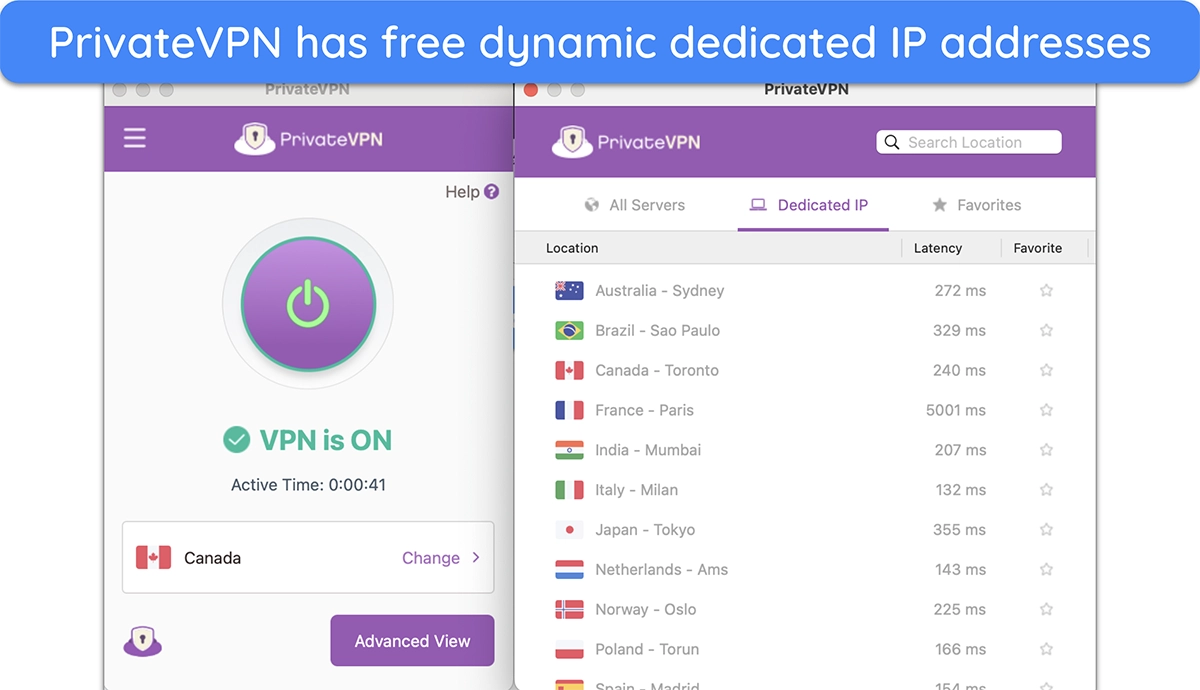What Is a Dedicated IP? How to Get It & Do You Need One?
If you’ve ever tried to log in to online banking and been forced through extra verification steps, or struggled with endless CAPTCHAs just to load a page, you know the pain of sharing an IP with strangers. This happens when you’re using a shared IP address, and when one user’s behavior triggers red flags, everyone using it pays the price.
A dedicated IP address solves this problem by giving you an IP that’s yours alone. Your activity stays separate, which reduces the chances of triggering security checks like CAPTCHAs. You can get a dedicated IP easily through a VPN, web and cloud hosting platforms, or even by requesting one from your ISP. Editor’s Note: We value our relationship with our readers, and we strive to earn your trust through transparency and integrity. We are in the same ownership group as some of the industry-leading products reviewed on this site: ExpressVPN, Cyberghost, Private Internet Access, and Intego. However, this does not affect our review process, as we adhere to a strict testing methodology.
Quick Summary: What Is a Dedicated IP Address?
Every time you go online, your device uses an IP address. It’s like a digital home address that tells websites and services where to send information. Most people use a shared IP address, which is exactly what it sounds like — an address many people use. A dedicated IP address, in contrast, is yours alone. No one else uses it, and that gives you more stability and control.
With a dedicated IP address, your connection always comes from the same place. For example, logging into a secure office network becomes quicker because the system recognizes your IP address instantly. You also avoid annoying roadblocks like constant CAPTCHAs or blocked access caused by someone else’s bad behavior on a shared IP address.
You can get a dedicated IP address from a few different places, depending on what you need it for. VPN services provide dedicated IPs for secure, reliable access to the internet. Web hosts offer them to improve website performance or enable private SSL certificates. If you need one for home or business, your ISP can set one up for things like hosting private servers.
The biggest perk of a dedicated IP address is consistency. It doesn’t change, and you’re not affected by what other users do. This makes it more reliable for things like secure banking, streaming, or managing online projects without interruptions.
Differences Between a Shared and Dedicated IP Address
Choosing between a shared and dedicated IP address comes down to how much control, reliability, and performance you need. Let’s break down the main differences so you can decide what works best for you.
Performance and Speed
With a shared IP address, your connection depends on the activity of others using the same IP. If another website or service linked to that IP gets flooded with traffic, your website could slow down or become temporarily inaccessible. This performance hit is common with VPNs that have a smaller server network, or in shared hosting environments with shared server resources.
A dedicated IP address ensures consistent performance because no one else affects your connection. For websites, this means faster loading speeds. For VPN users, it provides stable connections that don’t suffer from sudden usage spikes. This reliability makes dedicated IPs ideal for tasks like streaming, gaming, or running business-critical applications.
Security and Reputation
When you use a shared IP address, you inherit the reputation of everyone else using it. If another user sends spam, hosts malware, or engages in illegal activities, the IP could get blacklisted. This blacklisting affects every user, including you, and can lead to restricted access to websites, email services, or online platforms.
A dedicated IP avoids these problems entirely. Since only your activity is tied to the IP, no one else can compromise its reputation. This gives you peace of mind, especially if you run a business that depends on trust, like an e-commerce store or an online service dealing with sensitive customer data.
Email Deliverability
Shared IPs can create serious email problems. Many email services check the sending reputation of an IP address. If another user on the same shared IP sends spam or phishing emails, the IP could be flagged, and your legitimate emails might end up in spam folders.
A dedicated IP lets you control your email reputation. You can build trust with email providers, ensuring your messages reach recipients reliably. Businesses running email marketing campaigns or sending transactional emails — like order confirmations or password resets—benefit greatly from the improved deliverability of a dedicated IP.
SSL Certificates and Website Security
Modern shared IPs support SSL certificates through Server Name Indication (SNI), which allows multiple websites to use SSL on the same IP address. However, some older browsers and devices don’t support SNI. This means users on these systems might see security warnings when visiting your site.
A dedicated IP ensures complete compatibility with all devices. It also simplifies the setup for private SSL certificates, often required for e-commerce websites or online platforms handling sensitive information. Many businesses prefer dedicated IPs for their reliability and to avoid any potential compatibility issues.
Impact on SEO
A shared IP address can affect your site’s SEO score if other users on the same address engage in spammy practices. If a neighboring website hosts malicious content, search engines may associate the IP address with those activities. This association can damage your website’s credibility and ranking.
With a dedicated IP, your website stands on its own. Search engines evaluate your site based solely on your content and practices. This independence ensures that bad actors sharing your IP address won’t derail your SEO. If you’re serious about ranking well and maintaining credibility, a dedicated IP provides a clean slate.
Cost and Accessibility
Shared IPs are more affordable because the cost is distributed among many users. This makes them a great choice for personal websites, small businesses, or casual users who don’t need advanced features. For example, if you run a simple blog or a low-traffic site, a shared IP works perfectly fine.
Dedicated IP addresses cost more because they offer exclusive use. This higher price comes with significant benefits, like improved security, better performance, and control over how the IP is used. Businesses, high-traffic websites, and users with specific needs, such as bypassing IP-based restrictions, often find the extra cost worth it.
Benefits of Using a Dedicated IP Address
A dedicated IP address is like your own personal internet address that stays the same. It’s great for regular use, but it’s especially handy for more specific tasks. Here’s why you might want one:
- Host private servers or apps — With a dedicated IP, you can host private servers for games, apps, or secure work tools. Since it’s yours alone, you don’t have to share it with anyone, giving you more control and stability.
- Access region-locked platforms — Some platforms, like banks, licensing systems, or educational tools require an IP address from a specific location. A dedicated IP can help you access these services without restrictions.
- Set up secure access — Many secure systems, like financial tools or private databases, require you to whitelist an IP address for access. A dedicated IP ensures you always have a fixed address to meet these requirements.
- Run custom setups — If you need to configure a personal VPN, manage smart home devices, or handle other advanced tasks, a dedicated IP provides the flexibility to support these setups without issues.
- Secure file transfers — A dedicated IP makes connecting to FTP servers for file uploads, downloads, or backups easier and more secure. You won’t run into problems with changing or blocked IPs.
- Work with older devices — Some older systems don’t support newer types of IP addresses. A dedicated IP ensures compatibility, so you can avoid connection errors or unnecessary headaches.
Disadvantages of Using a Dedicated IP Address
A dedicated IP address can be really useful, but it’s not always the right choice for everyone. There are some potential downsides that might make it less appealing depending on your needs and tech skills. Here’s what you should know before deciding.
- Higher costs — A dedicated IP address is more expensive than a shared one because it’s exclusively assigned to you. This can be an issue if you’re on a tight budget and don’t need features like private servers or whitelisted access.
- Limited availability — IP addresses are limited resources, and in areas with high demand, it might take time to get a dedicated one. This can delay your setup if you’re in a crowded region or need one quickly.
- Requires technical knowledge — Setting up and maintaining a dedicated IP often involves manual configurations, like adjusting DNS settings or managing firewalls. If you’re not familiar with networking basics, this might feel overwhelming.
- Reduced anonymity — A dedicated IP makes your online activity easier to trace since it’s always linked to you. To protect your privacy, you’ll need a good VPN to mask your activities and ensure anonymity.
- Legal responsibility — Since all activity on a dedicated IP is tied directly to you, you’re responsible for anything that happens. If your IP is used for copyright violations or illegal activities, even unknowingly, you could face legal consequences.
- Potential security risks — Dedicated IPs can be more attractive to hackers because they’re not shared. Without proper security measures like firewalls and strong passwords, your IP could become a target for cyberattacks.
When Should I Use a Dedicated IP Address?
Sometimes shared or dynamic IP addresses create unnecessary problems. If you work with secure systems, custom setups, or strict access requirements, a dedicated IP address can make life much easier. Here’s when it’s especially helpful:
You Need Consistent Access to Platforms Without Login Issues
Frequent logouts happen when platforms detect changes in your IP, which is common with shared or dynamic IPs. A dedicated IP keeps your address stable and predictable, preventing these disruptions. You can stay logged into secure tools or portals without interruptions. It’s a simple way to make remote work or platform access smoother.
Your Website or Service Requires Unique DNS Setup
If your website or service needs custom DNS settings, a shared IP often falls short. A dedicated IP lets you configure DNS freely, supporting features like email authentication or secure traffic routing. This is crucial for businesses needing private or advanced setups. It ensures smooth operations without conflicts or limitations from shared resources.
You’re Integrating Third-Party Tools That Require Fixed IPs
Some third-party tools, like CRMs or payment gateways, require you to whitelist a specific IP for security. A dedicated IP ensures your address doesn’t change, meeting these security needs. This avoids issues with changing IPs and keeps integrations running smoothly. It’s a reliable option for any business using restricted-access tools.
You Operate a Location-Specific Online Service
If your service needs to operate as if it’s in a specific country, a dedicated IP tied to that region is essential. Industries like finance or government often have legal or licensing requirements for location-based services. A dedicated IP ensures compliance and avoids restrictions. It’s key for running smooth, region-specific platforms.
Your Network Needs Reliable Remote Access
Dynamic IPs change unexpectedly, making it difficult to connect remotely to private networks or servers. A dedicated IP solves this by giving you a fixed address that never changes. This makes remote access stable and consistent, whether for managing files or troubleshooting issues. It’s essential for any secure, remote network setup.
You Handle Compliance-Heavy Tasks
Industries like healthcare or finance have strict rules around secure communication and accountability. Regulations like HIPAA and PCI-DSS often require businesses to use dedicated IPs. A fixed IP ensures compliance, simplifies audits, and keeps sensitive data protected. It’s a must-have for anyone managing regulated systems.
You’re Managing a Development Environment
Testing and staging environments often need dedicated IPs for secure and predictable access. Shared IPs can cause conflicts, security risks, or disruptions during testing. A dedicated IP avoids these issues, offering full control over who accesses your environment. It makes deployment and testing much smoother for developers.
You Need to Troubleshoot Consistently Without IP Fluctuations
Shared IPs make troubleshooting a challenge because logs get cluttered with activity from other users. A dedicated IP keeps your traffic isolated, making it easier to track and resolve issues. It simplifies debugging and saves time by focusing only on your specific connection. It’s ideal for clean and effective troubleshooting.
How to Get a Dedicated IP Address
Getting a dedicated IP address depends on what you need it for. Here’s how you can get a dedicated IP based on your exact requirements:
- Web hosting provider — Hosts like Bluehost or SiteGround let you add a dedicated IP address. Buy it as an add-on or upgrade your plan. This works well for private SSL certificates or DNS configurations.
- Proxy services — Proxy providers like Bright Data offer dedicated IP addresses for secure browsing or scraping. Choose a plan, select a location, and integrate the IP into your tools.
- Get a VPN — Premium VPNs like ExpressVPN offer dedicated IP addresses as an add-on. Alternatively, PrivateVPN has free dynamic dedicated IP addresses in multiple locations (they aren’t shared but you get a different IP address for each session).
![Screenshot of PrivateVPN's dedicated IP servers]()
- Request from your ISP — Contact your Internet Service Provider (ISP) to request a static dedicated IP address. They’ll set it up for your home or business network. This is ideal for hosting servers or remote access.
- Cloud hosting platforms — Platforms like AWS or Google Cloud let you reserve a dedicated IP address during server setup. It’s perfect for businesses running virtual machines or custom apps.
- Colocation hosting services — Data centers hosting physical servers often provide dedicated IPs. Once your server is installed, they assign the IP, which you configure for your hardware.
FAQs About Dedicated IP Addresses
What is a dedicated IP address?
What’s the difference between a static and dedicated IP address?
How much does a dedicated IP address cost?
What’s the best VPN that offers dedicated IP addresses?
ExpressVPN is by far the fastest and most reliable VPN I’ve tested. It offers dedicated IP addresses in 20+ locations:
| Australia | Austria | Belgium | Canada | Denmark |
| France | Germany | Hong Kong | Ireland | Italy |
| Japan | Norway | Poland | Portugal | Singapore |
| Spain | Sweden | Switzerland | The UK (2 cities) | The US (7 cities) |
Other than that, CyberGhost, Private Internet Access, NordVPN, and Surfshark are all excellent VPNs with dedicated IP addresses available as paid add-ons. If don’t want to pay for this feature, PrivateVPN offers dynamic dedicated IPs, which change with each session but are unique to you during that time.
Choose a Reliable VPN With a Dedicated IP Address
A dedicated IP address solves specific problems that shared or dynamic IPs can’t handle. If you need consistent access, secure setups, or control over your online reputation, it’s a worthwhile investment. However, it’s not for everyone — if you just want to browse, stream, play games, and do normal activities, you don’t need a dedicated IP address.
Top VPNs often have dedicated IP addresses as a paid add-on. The advantage of using a VPN is that you get two benefits in one solution — a dedicated IP and online privacy with data encryption and location masking so that no one can trace your online activity back to your original IP address.
Top VPNs That Offer Dedicated IP Addresses
Editor's Note: We value our relationship with our readers, and we strive to earn your trust through transparency and integrity. We are in the same ownership group as some of the industry-leading products reviewed on this site: ExpressVPN, Cyberghost, Private Internet Access, and Intego. However, this does not affect our review process, as we adhere to a strict testing methodology.






Leave a Comment
Cancel